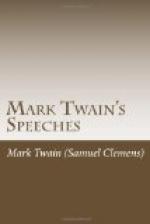I made an estimate some years ago, when I appeared before a committee of the House of Lords, that we had published in this country since the Declaration of Independence 220,000 books. They have all gone. They had all perished before they were ten years old. It is only one book in 1000 that can outlive the forty-two year limit. Therefore why put a limit at all? You might as well limit the family to twenty-two children.
If you recall the Americans in the nineteenth century who wrote books that lived forty-two years you will have to begin with Cooper; you can follow with Washington Irving, Harriet Beecher Stowe, Edgar Allan Poe, and there you have to wait a long time. You come to Emerson, and you have to stand still and look further. You find Howells and T. B. Aldrich, and then your numbers begin to run pretty thin, and you question if you can name twenty persons in the United States who—in a whole century have written books that would live forty-two years. Why, you could take them all and put them on one bench there [pointing]. Add the wives and children and you could put the result on, two or three more benches.
One hundred persons—that is the little, insignificant crowd whose bread-and-butter is to be taken away for what purpose, for what profit to anybody? You turn these few books into the hands of the pirate and of the legitimate publisher, too, and they get the profit that should have gone to the wife and children.
When I appeared before that committee of the House of Lords the chairman asked me what limit I would propose. I said, “Perpetuity.” I could see some resentment in his manner, and he said the idea was illogical, for the reason that it has long ago been decided that there can be no such thing as property in ideas. I said there was property in ideas before Queen Anne’s time; they had perpetual copyright. He said, “What is a book? A book is just built from base to roof on ideas, and there can be no property in it.”
I said I wished he could mention any kind of property on this planet that had a pecuniary value which was not derived from an idea or ideas.
He said real estate. I put a supposititious case, a dozen Englishmen who travel through South Africa and camp out, and eleven of them see nothing at all; they are mentally blind. But there is one in the party who knows what this harbor means and what the lay of the land means. To him it means that some day a railway will go through here, and there on that harbor a great city will spring up. That is his idea. And he has another idea, which is to go and trade his last bottle of Scotch whiskey and his last horse-blanket to the principal chief of that region and buy a piece of land the size of Pennsylvania.
That was the value of an idea that the day would come when the Cape to Cairo Railway would be built.
Every improvement that is put upon the real estate is the result of an idea in somebody’s head. The skyscraper is another idea; the railroad is another; the telephone and all those things are merely symbols which represent ideas. An andiron, a wash-tub, is the result of an idea that did not exist before.




